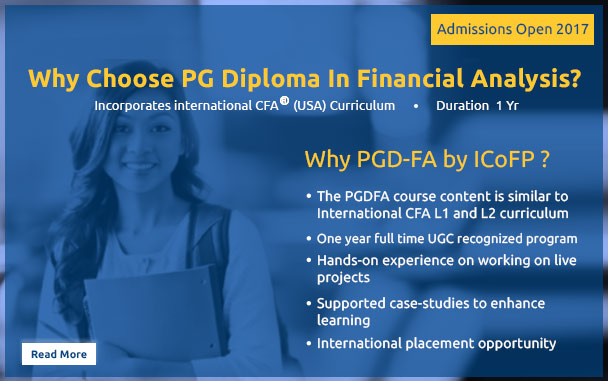Curriculum
Semester-1
1. Professional Ethics & Corporate Governance: In today’s dynamic finance world, professional ethics are a prerequisite for finance professionals. This subject lists down the code of ethics laid down by the Association of Investment Management & Research (AIMR) and explain the importance of ethical practices.
2. Security Analysis-1: This topic forms the core of investment research. This topic gives an overview of equity markets, indexes, and kind of equity instruments available in the market. This subject further delves into understanding of industry, sectors, and different stages of company growth which are foundation for equity research. Finally it talks about different kinds of valuation techniques like DCF, DDM.
- Debt Analysis: This topic covers understanding of structure of global bond markets and different kinds of fixed income instruments available in the market today. It also covers characteristics & risks involved in fixed income instruments, and analysis of fixed income yields & spreads.
- Alternate Investment Analysis: Alternate investments have a huge gamut of investment products like real estate, commodities, private equities, hedge funds, ETFs etc. These assets are used extensively these days for portfolio diversification. The topic studies these asset classes, their return and risk characteristics in detail.
- Derivative Strategies: It covers various types of derivative instruments such as forwards, futures, options, swaps etc and introduction to their application in risk management. It also explain the difference between different instruments and how they are used for hedging. It also talks about various mathematical models like Black-Scholes which are used for valuing options.
3. Financial Reporting & Analysis-1: Financial Statements are the focal point of investment research. It starts with basic principles and different kinds of financial reporting. It also explains components of financial statements – Balance sheet, Income statement (P&L) and Cash Flows statements. Later part of the curriculum delves into inventory valuation, ratio analysis and how to detect loopholes in financial statements.
4. Corporate Finance -1: The topic covers the principles that corporations use to make their investing and financing decisions. Initial part covers techniques of capital budgeting, measuring cost of capital & leverage. Later part covers management of working capital and dividend policies of a company.
5. Portfolio Management & Quantitative Techniques-1: This part is divided into two parts:
- Portfolio Management: Portfolio Management is one of the crucial process in managing assets. It gives an overview of how to construct a portfolio keeping in mind your client objectives, their risk appetite and constraints. Finally you study the theories of portfolio management and critically analyze them in the end.
- Quantitative Techniques: This topic discusses crucial concepts in finance like time value of money, discounted cash flows. This gets deeper into studying of statistical concepts, probability theory and hypothesis testing which are crucial for analyzing the data.
6. Advanced Economics: This topic covers in depth study of micro & macroeconomic school of thoughts. With perspective to finance, topic covers demand-supply equilibrium, firm output decisions & costs under micro economics. The macroeconomics part explains different market structures under which firms operate and goes on to explain how at macro level GDP is determined due to aggregate demand and supply interaction, how business cycles originate and finally impact of monetary & fiscal policies on economy.
Semester-2
1. Security Analysis-2: This topic is advanced extension of security analysis studied in previous semester, again is divided in four parts:
- Equity Analysis: This topic talks extensively about different valuation techniques used in valuing different sort of assets like DDM (dividend discount model), FCFF model (free cash flows to firm), FCFE (free cash flows to equity), EVA (economic value added) model and relative valuation techniques. This topic further details usability and constraints in using these techniques. Apart from valuation, this also digs deep into industry life cycles.
- Debt Analysis: This delves into studying term structure and volatility of interest rates. There’s further discussion on the valuation techniques for different fixed income instruments like valuation of bonds with embedded options. This subject further introduces the very popular mortgage backed securities, their return and risk characteristics and their valuation techniques.
- Alternate Investment Analysis: The Level1 introduces asset classes that form Alternate investments. This topic delves into valuation of real estate equity investments, publicly traded real estate securities, private equity valuation, hedge funds valuation etc.
- Derivative Strategies: This topic explain complexities of derivative instruments and valuation of forward contracts, future contracts, options, swap markets, credit default swaps and interest rate derivative instruments.
2. Economics for Valuation: This topic focuses on linking thus far learnt economics concepts with valuation of securities by explaining the impact of macroeconomic environment on firm’s profitability. Focus of this topic is on Growth theories, exchange rate theories & Concepts and measures of economic growth.
3. Financial Reporting & Analysis-2: In this advanced version some key issues that affect company valuations are covered in details. It covers analysis of M&A Accounting, Post-Employment and Share-Based compensation, Multinational Operations and how different accounting policies may affect analytical interpretation and how to troubleshoot it. In the end you study advanced techniques of ratio analysis & determining quality of earnings.
4. Corporate Finance-2: Topic covers advanced discussion on capital budgeting principles, dividend policy, capital structure policy, corporate governance and M&A strategies.
5. Portfolio Management & Quantitative Techniques-2: This reading has 2 parts:
- Portfolio Management: Topic introduces a popular extension to Markowitz portfolio theory studied in sem 1, the Capital Asset Pricing Model and explains how to quantify & diversify portfolio risk using efficient portfolios. Later you study more theories such as theory of active portfolio management, international diversification and managing taxation to maximize post tax gains and finally constructing investment policy statement.
- Quantitative Techniques: Topic focuses on popular quantitative tool in research, the regression analysis. It covers single, multivariable and time series regression models along with techniques to assess credibility of such tests, called ANOVA.
6. Professional Ethics -2: Except some new ethical principles, topic repeats most part of ethical standards read in sem 1, it shows great amount of importance given to this topic

